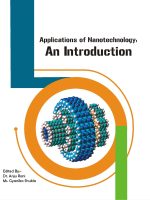The book titled “Pharma4.0 : Digitalization of Pharma Industry with Inclination towards Industry 4.0” is a technological voyage of pharma industry with inclination towards Industry4.0. Digitalization plays a significant role in present era. Digitalization of pharmacy industry is related to implement intelligent infrastructure to enhance production activities, and to boost transparency and adaptivity. The aim of this book is to provide the pioneering and transdisciplinary topic of integration of technology in pharmacy. It fosters and empowers the researchers to contribute on transdisciplinary topics that may benefit the industries to adopt digitalization in pharmacy for delivering precision services to the customers.
The scope of the book is to deliver the knowledge of current and future application of digital technologies like Internet of Things (IoT), Artificial Intelligence (AI), machine learning (ML), blockchain, robotics, precision medicine, 3D printing, drones, augmented reality (AR), virtual reality (VR), for strengthening the pharmacy industry in terms of quality monitoring.
ORGANIZATION OF THE BOOK
The book is organized to include twelve chapters. Details as followsrelated rudiments and applications of deep learning in various industries viz. healthcare, transportation and agriculture etc. The book comprises of nine chapters. A brief description of each of the chapters of this book is as follows:
Chapter 1: Discusses the of potential IoT-based healthcare applications is offered. The development of the Healthcare Internet of Things (HIoT) application has been discussed in this article from the perspectives of industry 4.0, technologies, and medical assistance to address various care encounters.
Chapter 2: Provides a comprehensive study of Digital Twins for the Implementation of Future Pharmaceutical Manufacturing
Chapter 3: Discusses the applications of AI and IoT in the different aspects of manufacturing including pre- maintenance and live equipment monitoring, particle size analysis for drug manufacturing, scaling up wet granulation process, visual quality inspection, quality inspection of capsules, bottle-packaging detection, infusion bag detection, etc.
Chapter 4: Presents the significance of 3D printing for the applications of personalized medicine. Initially the overview of 3D printing with its assistive technologies are discussed.
Chapter 5: Summarizes recent developments in this field. Threedimensional bioprinting is a technique that uses 3D printing to create tissue, organs, and biomedical parts that mimic natural tissue architecture.
Chapter 6: Focuses on the overview of 3D organ printing, its techniques for manufacturing customized organs and tissues and various requirements for the same.
Chapter 7: Investigates how certain healthcare providers are beginning to employ augmented and virtual reality (AR and VR) as a strategic marketing tool for a variety of purposes, including the promotion of novel medical and surgical equipment as well as patient education.
Chapter 8: Describe how blockchain technology can be used throughout the supply chain for drugs to enhance system accountability, access, and protection. The industry will use the proposed system to trace the pharmaceuticals from their manufacture until they are given to patients.
Chapter 9: Explores the therapeutic, research, and educational uses of virtual reality in pharmacy.
Chapter 10: Focuses on the paradigm of the various stages of drug discovery has been changed. Pharmaceutical industries are employing AI-based drug development approaches to treat various disorders such as Parkinson’s disease, diabetes, Alzheimer’s disease, obsessive-compulsive disorder, and others. AI is also being applied in the development of nanomedicines and nanorobots.
Chapter 11: Elaborates a brief insight of need for and importance of more clear and more ideal treatment and strategies to increase patient care and to promote public health through master health treatment designed after molecular level analysis of each patient.
Chapter 12: Discusses a reward and employee motivation with a case study of pharmacy sector in Delhi NCR. Thus, the aim of this book is to familiarize researchers with the latest trends in pharma industries with inclination towards Industry4.0.
Prof.(Dr.) Rajesh Singh
Prof.(Dr.) Anita Gehlot










Be the first to review “Pharma 4.0: Digitalisation of Pharma Industry with Inclination towards Industry 4.0”
You must be logged in to post a review.